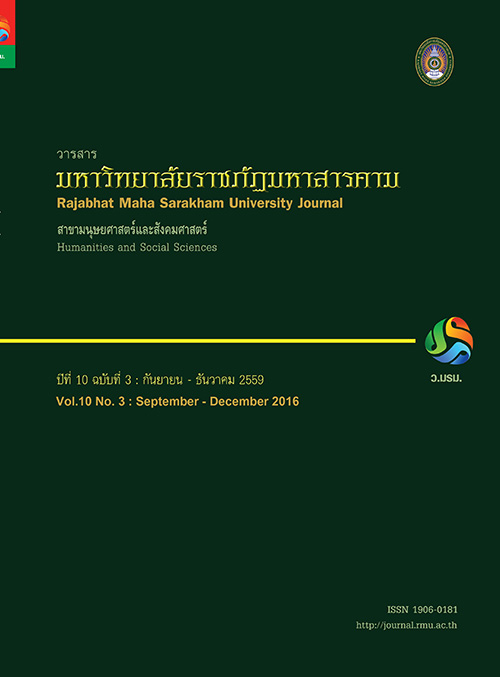สัมฤทธิผลของการจัดการวิสาหกิจชุมชนในจังหวัดกาฬสินธุ์;The Success Model for Enterprise Community Management in Kalasin Province
Main Article Content
บทคัดย่อ
การวิจัยครั้งนี้ มีวัตถุประสงค์เพื่อ 1) ศึกษาปัจจัยที่ส่งผลต่อการจัดการวิสาหกิจชุมชน ในจังหวัดกาฬสินธุ์ 2) สร้างรูปแบบ
การพัฒนาสัมฤทธิผลของการจัดการวิสาหกิจชุมชนในจังหวัดกาฬสินธุ์ และ 3) ประเมินผลตรวจสอบยืนยันรูปแบบการพัฒนาสัมฤทธิ
ผลของการจัดการวิสาหกิจชุมชนในจังหวัดกาฬสินธุ์ วิธีดำเนินการวิจัยแบ่งออกเป็น 2 ระยะ ซึ่งระยะที่ 1 เป็นการวิจัยเชิงปริมาณ โดย
ศึกษาปัจจัยเชิงสาเหตุที่ส่งผลการจัดการวิสาหกิจชุมชนในจังหวัดกาฬสินธุ์ประชากร ได้แก่ ตัวแทนกลุ่มวิสาหกิจชุมชนในจังหวัดกาฬสินธุ์
1,267 กลุ่ม กลุ่มละ 3 คน คือ หัวหน้ากลุ่ม 1 คน ฝ่ายการเงิน 1 คน และ ฝ่ายการตลาด 1 คน รวมเป็นจำนวน 3,801 คน
กลุ่มตัวอย่าง ได้แก่ ตัวแทนกลุ่มวิสาหกิจชุมชนในจังหวัดกาฬสินธุ์ จำนวน 362 คน โดยใช้วิธีการกำหนดขนาดกลุ่มตัวอย่างตามสูตร
ของทาโร ยามาเน่ เครื่องมือที่ใช้ในการวิจัยเป็นแบบสอบถามแบบมาตราส่วนประมาณค่า ซึ่งมีค่าความเชื่อมั่นทั้งฉบับเท่ากับ .92 สถิติ
ที่ใช้ทดสอบสมมติฐาน ได้แก่ การวิเคราะห์สมการโครงสร้างเชิงเส้นโดยใช้โปรแกรมลิสเรล (Lisrel) และสหสัมพันธ์เพียรสัน (Pearson
correlation) ระยะที่ 2 เป็นการวิจัยเชิงคุณภาพ โดยผู้วิจัยได้สร้างรูปแบบการพัฒนาสัมฤทธิผลของการจัดการวิสาหกิจชุมชนในจังหวัด
กาฬสินธุ์ แล้วนำรูปแบบนั้นไปให้ผู้เชี่ยวชาญประเมินผลตรวจสอบยืนยัน (Expert verify) และวิพากษ์ให้ข้อเสนอแนะแนวทางการ
ปรับปรุงโดยเก็บรวบรวมข้อมูลจากแบบสอบถามยืนยันรูปแบบการวิจัย ซึ่งมีทั้งแบบสอบถามมาตราส่วนประมาณค่าและแบบวิจารณ์
จากนั้นได้ทำการวิเคราะห์และสังเคราะห์ข้อมูล แล้วนำมาเทียบเคียงกับบริบทของการวิจัยและปรับปรุงแก้ไขจนได้รูปแบบการพัฒนา
สัมฤทธิผลของการจัดการวิสาหกิจชุมชนในจังหวัดกาฬสินธุ์ที่สมบูรณ์ ผลการวิจัยพบว่า
ปัจจัยที่มีผลต่อการจัดการวิสาหกิจชุมชนในจังหวัดกาฬสินธุ์โดยเรียงลำดับ คือ ด้านประสิทธิภาพการจัดการการเงิน
ด้านประสิทธิภาพการควบคุมการผลิต ด้านประสิทธิภาพการจัดการทรัพยากรบุคคล ด้านการสนับสนุนจากสื่อสารมวลชน ด้านการ
สนับสนุนจากหน่วยงานภาครัฐ รูปแบบการพัฒนาสัมฤทธิผลของการจัดการวิสาหกิจชุมชนในจังหวัดกาฬสินธุ์ ได้แก่ การขอรับการ
สนับสนุนจากหน่วยงานภาครัฐ การเพิ่มประสิทธิภาพการจัดการการเงิน การเพิ่มประสิทธิภาพการควบคุมการผลิต การเพิ่มประสิทธิภาพ
การจัดการทรัพยากรบุคคล และการขอรับการสนับสนุนจากสื่อสารมวลชน รูปแบบการพัฒนาฯ นี้มีความเป็นไปได้อยู่ในระดับมาก
The purposes of the research were to 1) analyze the factors affecting enterprise community management
in Kalasin Province 2) establish a model for development enterprise community management in Kalasin
Province and 3) evaluate the model by expert verify. The research methodology was divided into two phases:
1) quantitative research 2) qualitative research. Phase 1 focused on analyzing the factors affecting enterprise
community management. The population was three thousand eight hundred and one the register of enterprise
community in Kalasin province, and the sample was three hundred and sixty two the register of enterprise
community in Kalasin province. Taro Yamane method was employed for calculating the sample size. The
instrument was a questionnaire with .92 reliability index. The statistics used were LISREL with the .05 level of
statistical significance, and Pearson Correlation. Phase 2 focused on designing and assessing a model for
enterprise community management by experts, and the model was assured by the Expert Verify technique
and criticizing method. The data were collected by questionnaires and criticizing forms, and the data analyzed
and synthesized were compared with the research context and used to improve a model based.
Results of the research were as follows:
The finding showed that the factors affected enterprise community management in Kalasin Province
was performance money management, performance product control, performance human resource
management, communication support and government support. The success model development for enterprise
community management consisted of five training workshop curricular: performance money management,
performance product control, performance human resource management, communication support and
government support. The findings indicated that the value of the training model efficiency regarding the
assessment of the experts was at a high level.
Article Details
1. บทความที่ลงตีพิมพ์ทุกเรื่องได้รับการตรวจทางวิชาการโดยผู้ประเมินอิสระ ผู้ทรงคุณวุฒิ (Peer Review) สาขาที่เกี่ยวข้อง อย่างน้อย 3 ท่าน ในรูปแบบ Double blind review
2. ข้อคิดเห็นใด ๆ ของบทความที่ลงตีพิมพ์ในวารสารมหาวิทยาลัยราชภัฏมหาสารคาม นี้เป็นของผู้เขียน คณะผู้จัดทำวารสารไม่จำเป็นต้องเห็นด้วย
3. กองบรรณาธิการวารสารมหาวิทยาลัยราชภัฏมหาสารคาม ไม่สงวนสิทธิ์การคัดลอกแต่ให้อ้างอิงแสดงที่มา


